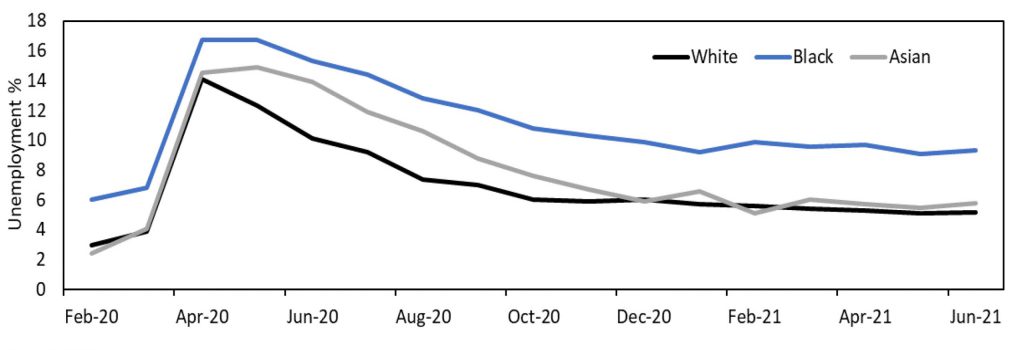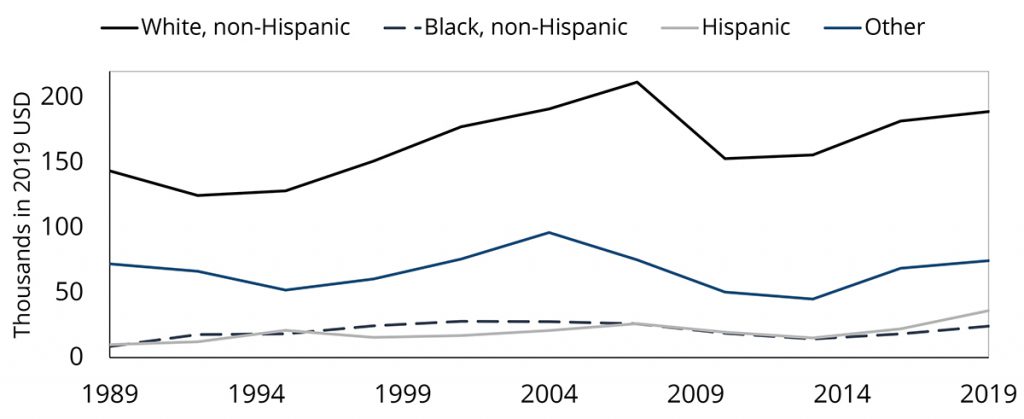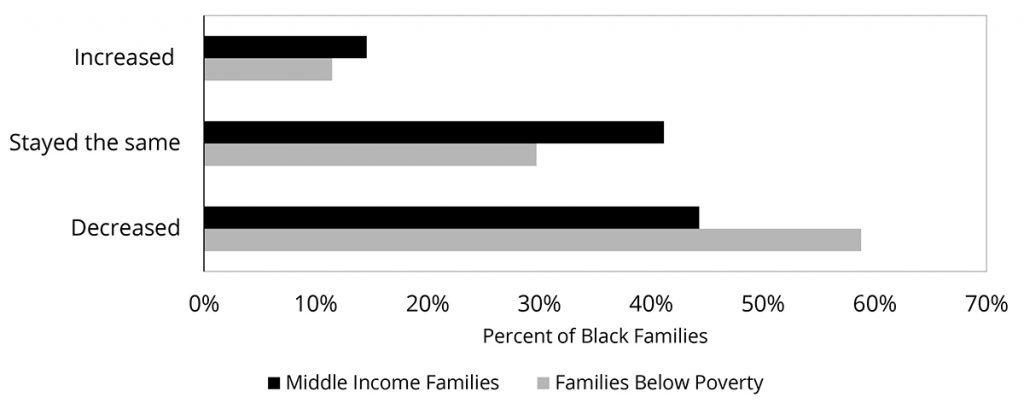In response to COVID-19, the Biden administration proposed a multi-trillion dollar “Build Back Better Plan,” which includes two signature policies: The American Rescue Plan (signed into law in March 2021) and American Families Plan (proposed in April).1 Together, the two plans cover a lot of territory — housing, education, healthcare, childcare, paid leave and more. Many Americans stand to gain from the policies, whether through direct aid for their family, better education and job prospects, or through community-based programs that support small businesses and public health infrastructure. However, the primary purpose of these policies is to help those hit hardest by the pandemic and its myriad follow-on effects.
The pandemic has been devastating for many, but this devastation has not been experienced equally. In a previous Kenan Insight, UNC Kenan-Flagler Business School’s Dr. Jim Johnson noted that the working poor, a group disproportionally comprised of Black Americans, were traumatically disrupted when stay-at home orders and economic shutdowns were put in place. Black Americans were particularly susceptible to the economic fallout of COVID-19 because they are disproportionally concentrated in low-wage employment industries, such as the hospitality and service sectors, due to longstanding discriminatory economic systems and policies.2 In addition, even before the pandemic, Black Americans have been systematically underemployed and have and continue to experience higher unemployment rates – resulting in Black families being less able to develop a financial cushion and increase net wealth. The shutdown compounded the financial, social and psychological strain that many of these workers and their families faced prior to pandemic.

Therefore, if the Biden administration’s policies are implemented according to their intention to help those most affected by the pandemic, perhaps the greatest benefits could be felt among the segment of Americans who have faced disproportionate burdens in terms of both health and wealth for generations: Black families.

UNC Research Professor of Public Policy Iheoma Iruka, who also serves as founding director of the Equity Research Action Coalition at UNC Frank Porter Graham’s Child Development Institute, conducted a recent study with colleagues to explore how Black families are faring in the face of dual threats from racism and the COVID-19 pandemic.3
In a survey of more than 8,000 families (including 768 Black families) conducted between April and November 2020, the researchers found Black families were experiencing high economic instability regardless of income level. Half reported a decrease in income during the pandemic and more than half reported experiencing at least one form of material hardship, such as trouble paying for basic needs like food or housing, despite many receiving stimulus checks and other forms of aid.

In addition to its financial effects, the pandemic brought a disproportionate health burden in Black communities and profoundly affected daily life for Black families. Many parents delayed medical visits for themselves or their children and stopped in-person participation in school and childcare. According to the survey, these shifts were more pronounced in Black families than in other racial groups, and were accompanied by increased stress, anxiety and depression in parents and emotional concerns in children.
Of course, these problems didn’t start — and won’t end — with COVID-19. Many Black parents in the survey reported experiencing discrimination both before and during the pandemic, and more than one quarter said they were concerned about their children’s experiences and treatment. Parents were particularly concerned about their child facing harsh punishment, receiving unfair treatment or having fewer life choices due to their race.
The heavy toll of the pandemic on Black communities is just the latest manifestation of a centuries-long disparity that has held Black families back from accruing wealth, accessing what they need to stay healthy and receiving equal treatment in American society. To meaningfully and materially change that requires not only intention, but action.
“There is an urgent need for anti-racist policies and strategies that promote positive outcomes and opportunities for Black families and children,” Iruka and colleagues write. The authors further define anti-racist policies as those designed to work toward racial equity, meaning that everyone has a fair and just opportunity to thrive and reach their potential regardless of their race and skin color. For instance, they cite that we continue to see unfair access for Black adults, such as to banking and financial resources,4 as well as in experiences with Black children, who are 2.5 times more likely than their peers to be suspended or expelled in preschool.5
“To move the needle for Black families,” Iruka says, “equitable policies must preserve Black children’s positive racial identity, protect them and their families from harm, and promote their health, economic stability and mobility. ‘Equal’ treatment is not always right; policies must actively combat racism and inequities by repairing the historical harm.”
To counter the burdens revealed in their survey, the researchers suggest strategies should include financial tools to stabilize families, healthcare models that are culturally grounded to meet the needs of Black communities, and policies that prioritize in-person learning for Black children along with paid sick and personal leave for parents. Policies targeting a specific group or “policy user” are not uncommon. While there is legislation that is universal, such as tax policies or education requirements, many policies have specific aims to benefit targeted groups. For example, the Head Start Act requires Head Start programs to identify and support the development and learning needs of dual language learners, including promoting the literacy development of children’s native languages.6
Biden’s policies and proposals are aligned with these ideas. They stand to put real money in the right places and truly make life better for many Black families. But they won’t erase the yawning wealth gap between Black and white Americans overnight, and they won’t necessarily drive sustained economic growth in Black communities. And as always, the devil will be in the details. Many past programs designed to alleviate poverty or make higher education affordable for lower-income families are so bureaucratic and cumbersome to navigate that they become nearly impossible to access, especially for the people who need them most.
The multi-trillion dollar investments President Biden envisions could go a long way toward closing pervasive gaps in American society. But to truly have a lifelong impact on today’s Black children, these policies will need to be implemented in ways that ensure the benefits reach their intended recipients — and are accompanied by a broader cultural change.
“We can’t buy our way out of racism,” Iruka notes. “Overcoming systemic racism requires shifting our culture, policies and practices to be more equitable and less centered around maintaining historical systems that don’t work for all Americans.”
Can the Biden administration’s policy prescriptions really make a dent in the crushing inequalities that have plagued Black Americans since before the country’s founding? Will they not only help individuals regain their footing after the COVID-19 pandemic, but enable Black communities to “build back stronger?” Can these investments help create a better economic future for Black families?7
“Twenty years from now, the policies of the Biden administration have the potential to change the socio-economic trajectory of an entire generation,” says Mark Little, executive director of CREATE at the Kenan Institute of Private Enterprise. “The potential to close education and income disparities for Black children is promising, but will require policies that reflect the unique circumstances, history and challenges facing African American families.”
1 Build Back Better. (n.d.). The White House. Retrieved July 14, 2021, from https://www.whitehouse.gov/build-back-better/
2 Fragale, A., Johnson, J., Leigh, A., Melwani, S., & Pearsall, M. (2020, May 6). A Strategic Response to the Coronavirus Pandemic for the African American Working Poor [Frank Hawkins Kenan Institute of Private Enterprise]. Kenan Insight. https://kenaninstitute.unc.edu/kenan-insight/a-strategic-response-to-the-coronavirus-pandemic-for-the-african-american-working-poor/
3 Iruka, I. U., Curenton, S. M., Sims, J., Escayg, K.-A., Ibekwe-Okafor, N., & RAPID-EC. (2021). Black Parent Voices: Resilience in the Face of the Two Pandemics—COVID-19 and Racism. Researchers Investigating Sociocultural Equity and Race (RISER) Network. https://www.bu-ceed.org/riser-network.html
4 Liu, S., & Parilla, J. (2020). New data shows small businesses in communities of color had unequal access to federal COVID-19 relief. Brookings. https://www.brookings.edu/research/new-data-shows-small-businesses-in-communities-of-color-had-unequal-access-to-federal-covid-19-relief/
5 Office for Civil Rights. (2016). Data Snapshot: School Discipline, Issue Brief No. 1. U.S. Department of Education, Office for Civil Rights. http://ocrdata.ed.gov
6 United States Department of Health and Human Services and Department of Education. (n.d.). Policy Statement on Supporting the Development of Children Who Are Dual Language Learners in Early Childhood Programs. https://eclkc.ohs.acf.hhs.gov/sites/default/files/pdf/dll-policy-statement-final.pdf
7 Little, Mark. (2020). Black Economic Futures [Frank Hawkins Kenan Institute of Private Enterprise]. Kenan Insight. https://kenaninstitute.unc.edu/kenan-insight/black-economic-futures/